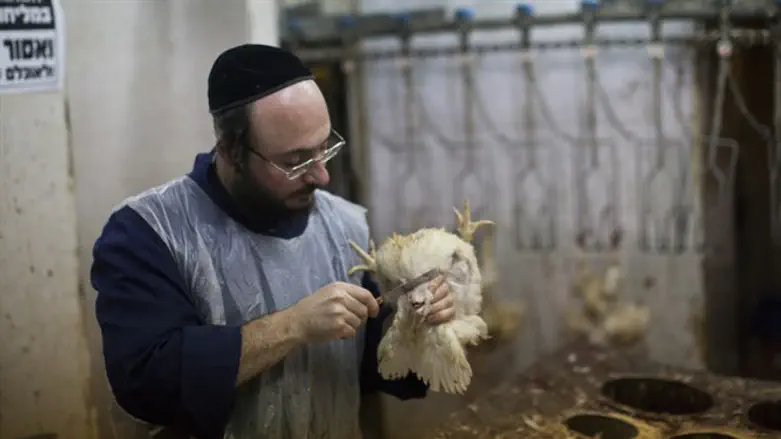
JTA - A cabinet minister in Belgium’s Flemish Region announced that a majority of lawmakers have decided to impose new limitations on ritual slaughter of animals in 2019.
Ben Weyts, the animal welfare minister of the Flemish Region — one of three autonomous states that make up the federal kingdom of Belgium – on Thursday told the Gazet van Antwerp daily newspaper that “the decision in principle has been taken and everyone should respect it.”
He was commenting on criticism by some Jews and Muslims in Belgium over his announcement Wednesday in the Flemish parliament that new limitations on the slaughter of animals without stunning would be introduced on Jan. 1, 2019.
Neither the elected representatives of the Jewish community of the Flemish Region nor of those of Belgium have expressed consent to the plan to impose new limitations, which Weyts described as a “compromise” and “historical agreement.”
Contrary to some reports in the media, the Flemish parliament did not vote on a ban, according to the De Morgen daily. Instead, the plan to introduce the new limitations was announced Wednesday as the result of an agreement between the coalition partners of the center-right New Flemish Alliance ruling party.
The precise nature of the new limitations proposed by the Flemish government has not yet been made public and has not been finalized pending talks with representatives of the Jewish and Muslim communities, according to the Gazet van Antwerpen. Pinchas Kornfeld, an influential rabbi from Antwerp who acts as spokesperson for the region’s communities and is chairman of the European Shechita Board, would not comment on the details of the proposed limitations, the Joods Actueel Jewish paper reported.
Shechita is the Hebrew word for the Jewish Orthodox method of slaughtering animals. It requires they be conscious when their throats are slit, a practice that critics say is cruel but which advocates insist is more humane than mechanized methods used in non-kosher abattoirs. Muslims slaughter animals in a similar method – albeit with fewer restrictions — to produce halal meat.
According to Joods Actueel, the minister is seeking the consent of Muslim and Jewish faith communities to a proposal in which small animals would be non-lethally stunned with electricity before they are killed. Larger animals would receive “irreversible stunning” — a term which usually describes a bolt pin to the brain — within seconds of the slashing of their throats in a procedure known as post-cut stunning. Some Orthodox Jewish communities and their faith leaders, including in Austria, have accepted post-cut stunning.
Kornfeld declined to comment on the proposal. “We will study it calmly and then react,” he told Joods Actueel.
The issue of banning shechita has been a subject of dispute in recent years in Holland, Denmark, Sweden, and other countries, some of which have banned ritual slaughter in a reminder of Nazi Germany's ban during the 1930s.
Former Chief Rabbi Lord Jonathan Sacks spoke in the British Parliament on the subject of shechita in January 2014, where he argued shechita "is designed to minimize animal pain. ...Pre-stunning by captive bolt...often fails at the first attempt. According to the European Food Safety Authority’s report in 2004, the failure of penetrating and non-penetrating captive bolts affects around 10 million animals, causing the animal grave distress."
Rabbi Genack of the US-based OU kashrut supervision, has said there is no serious movement to ban shechita in the United States, which has a thriving animal rights activist movement. Shechita is categorized as humane slaughter in the USA.
"The Humane Slaughter Act, passed in the late 1960s, designates kosher as a humane means of slaughter," he said. "If the animal is killed in a steady stroke, it becomes insensate almost immediately. When the animal is stunned, you can see signs of pain significantly higher. So kosher slaughter may be more humane."
The European Jewish Association, a Brussels-based lobby group, condemned the announcement about the Flemish government’s plan to introduce new limitations on ritual slaughter, which the group said amounted to a ban on the practice.
“Let’s stop pretending that banning kosher slaughter has anything to do with animal welfare,” said the group’s leader, Menachem Margolin. It is “dubious, unsettling and running contrary to [scientific] evidence,” added Margolin, who is a rabbi affiliated with the Chabad hasidic movement. His association said the government of Belgium’s Walloon Region is planning to announce a similar plan next year.
Antwerp, capital of the Flemish Region, has 18,000 Jews, roughly half of the Jewish population of Belgium. The city’s kosher abbatoirs provide meat to many Jewish communities in Europe.